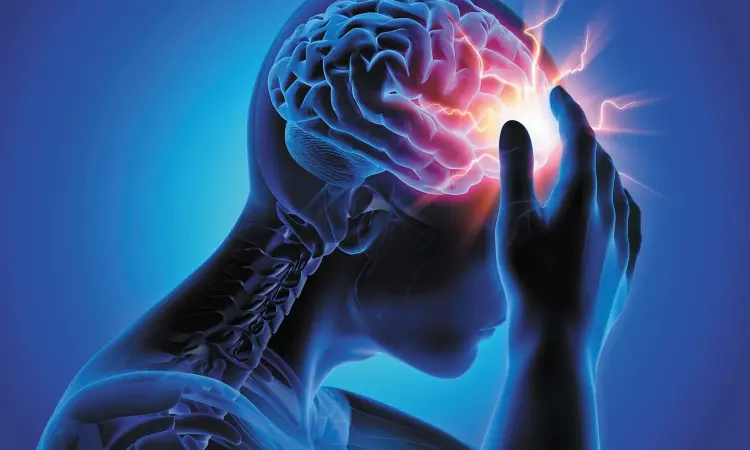- Home
- Medical news & Guidelines
- Anesthesiology
- Cardiology and CTVS
- Critical Care
- Dentistry
- Dermatology
- Diabetes and Endocrinology
- ENT
- Gastroenterology
- Medicine
- Nephrology
- Neurology
- Obstretics-Gynaecology
- Oncology
- Ophthalmology
- Orthopaedics
- Pediatrics-Neonatology
- Psychiatry
- Pulmonology
- Radiology
- Surgery
- Urology
- Laboratory Medicine
- Diet
- Nursing
- Paramedical
- Physiotherapy
- Health news
- Fact Check
- Bone Health Fact Check
- Brain Health Fact Check
- Cancer Related Fact Check
- Child Care Fact Check
- Dental and oral health fact check
- Diabetes and metabolic health fact check
- Diet and Nutrition Fact Check
- Eye and ENT Care Fact Check
- Fitness fact check
- Gut health fact check
- Heart health fact check
- Kidney health fact check
- Medical education fact check
- Men's health fact check
- Respiratory fact check
- Skin and hair care fact check
- Vaccine and Immunization fact check
- Women's health fact check
- AYUSH
- State News
- Andaman and Nicobar Islands
- Andhra Pradesh
- Arunachal Pradesh
- Assam
- Bihar
- Chandigarh
- Chattisgarh
- Dadra and Nagar Haveli
- Daman and Diu
- Delhi
- Goa
- Gujarat
- Haryana
- Himachal Pradesh
- Jammu & Kashmir
- Jharkhand
- Karnataka
- Kerala
- Ladakh
- Lakshadweep
- Madhya Pradesh
- Maharashtra
- Manipur
- Meghalaya
- Mizoram
- Nagaland
- Odisha
- Puducherry
- Punjab
- Rajasthan
- Sikkim
- Tamil Nadu
- Telangana
- Tripura
- Uttar Pradesh
- Uttrakhand
- West Bengal
- Medical Education
- Industry
Weight loss drugs may help prevent stroke and reduce brain injury-related complications, studies show

Three studies presented today at the Society of NeuroInterventional Surgery's (SNIS) 22nd Annual Meeting discussed whether using GLP-1 inhibitors could lessen the impacts of stroke and related brain injuries or reduce the risk of stroke altogether. These medications, which lower blood sugar and often cause weight loss, are commonly prescribed for type 2 diabetes and obesity.
In the first study researchers at the University of Wisconsin–Madison used patient data from both the university’s medical center and a global health collaborative to see whether patients on who experienced strokes had better outcomes than patients not taking GLP-1 inhibitors. The global dataset included 2,021,704 patients who had experienced stroke, 43,338 of whom were also on Ozempic, and the University of Wisconsin dataset included 13,510 people who had experienced stroke, 190 of whom used GLP-1 inhibitors. Death from stroke was lower for GLP-1 inhibitors users across both cohorts. In the global dataset, 5.26% of Ozempic users initially died from their strokes compared to 21.61% of non-users, and GLP-1 inhibitors users also had a 77.5% chance of surviving their strokes long term compared to 30.95% of non-GLP-1 inhibitors users. The university cohort showed similar results, with 5.26% of GLP-1 inhibitors users dying from stroke versus 26.57% of patients not using GLP-1 inhibitors.
In the second study, also researchers examined a large nationwide sample of emergency department records for people who experienced stroke and people who were likely using GLP-1 inhibitors. They found associations between potential GLP-1 inhibitors users and significantly reduced odds of stroke. The research team suggests taking this research further to evaluate data directly from pharmacies to be even more precise about the relationship between GLP-1 inhibitors and stroke prevention.
The third study, “Impact Of GLP-1 Agonists on Stroke, SAH, and ICH: A Propensity-matched Multi-institutional Cohort Study,” was presented by researchers from the University of Texas Medical Branch in Galveston. They investigated whether GLP-1 inhibitors could improve patient outcomes after brain hemorrhages (both spontaneous bleeds and those due to brain aneurysm rupture) and stroke. The team reviewed patient records from 6 months and 12 months after each brain hemorrhage and 1 year and 2 years after each stroke, finding that GLP-1 inhibitor use was connected to a reduced risk of cognitive side effects, seizures, future brain hemorrhage and death after brain hemorrhage and stroke.
According to Ahmed Elbayomy, MD, a research fellow and data scientist in the Department of Neurological Surgery at the University of Wisconsin–Madison and primary author of two of these studies, these results are very promising. “More research is certainly needed, but seeing the potential protection offered by these medications is a fascinating finding.”
“This research could introduce a new perspective to the discussion of preventing and mitigating the devastating effects of stroke and related brain injuries,” added Matias Costa, MD, from the Neurosurgery Department at the University of Texas Medical Branch and author of the third study.
Dr Kamal Kant Kohli-MBBS, DTCD- a chest specialist with more than 30 years of practice and a flair for writing clinical articles, Dr Kamal Kant Kohli joined Medical Dialogues as a Chief Editor of Medical News. Besides writing articles, as an editor, he proofreads and verifies all the medical content published on Medical Dialogues including those coming from journals, studies,medical conferences,guidelines etc. Email: drkohli@medicaldialogues.in. Contact no. 011-43720751


